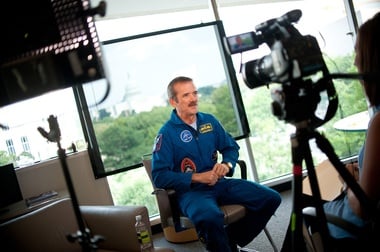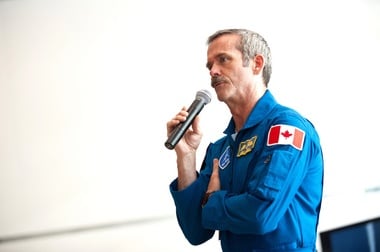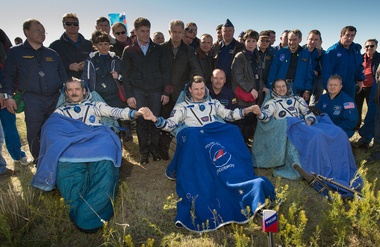Chris Hadfield is an amazing human being. He commanded the International Space Station. He used YouTube to teach us about life in orbit. He used Twitter to give us a new perspective on our planet. He did that viral cover of Bowie’s Space Oddity.
Then he came home. He wrote a book called An Astronaut’s Guide to Life on Earth. I read that book. It was awesome. Here are some things I learned from it.
1. Have an attitude
In NASA terminology, your attitude is your orientation relative to two positions, for example your spaceship relative to the Earth and a satellite. Losing your attitude is bad, because you could end up drifting, lost and alone in outer space.
Chris Hadfield also thinks of life trajectory like attitude control – you need to stay on the right path to achieve your goals. It’s always not in your control whether you get there or not, but you can do everything in your power to make it happen. In life, losing your attitude – drifting from your path – is way worse than not reaching your destination.
2. Aim for zero
In any given situation, according to Hadfield, you’re either a ‘plus-one’, a ‘zero’ or a ‘minus-one’. If you’re a plus-one, you’re actively adding value. If you’re a zero, you’re generally competent and don’t get in the way. Being a minus-one sucks, because you’re a liability and actively cause problems.
However, if you’re a plus-one and you walk into a situation trying to prove how great you are, you can go from a plus one to a minus one – your ‘I got this’ mentality might easily irritate and prove detrimental to the dynamic.
So the best thing to do in a new situation? Aim for zero. Listen. Observe. Offer advice. Don’t try to take control of everything. If you know what you’re doing, you won’t need to tell people you’re a plus one. They’ll know it.
3. Utilise the power of negative thinking
‘Negative thinking’ sounds pessimistic. Defeatist. But when you think about it, planning for the worst can actually be energising and confidence-boosting. How? Well, if you always prepare a contingency for every scenario you’ll never be caught off-guard.
Chris Hadfield’s approach is to ask: “What’s the next thing that could kill me?” It sounds exhausting and masochistic. But actually, it isn’t. By thinking about what could go wrong in any specific situation, you preempt problems with your own solutions.
And that means you can actually relax and enjoy life, knowing you’re ready to act if things go wrong.
4. Sweat the small stuff
“An astronaut who doesn’t sweat the small stuff is a dead astronaut,” says Hadfield. The lesson: averting disaster isn’t about making one-off life-or-death decisions – it’s about learning and understanding all the little things that develop into a bigger issue. An example of astronaut small stuff is knowing the ‘boldface’ – the tried-and-tested instructions that make up NASA’s Flight Rules manual.
Not sweating the small stuff runs counter to conventional wisdom, yet there’s truth in it. Yes, an astronaut’s work environment is radically more hostile and dangerous than most people’s. But the point is that paying attention to the granular details – like physical health symptoms or signs of car trouble – makes you incrementally safer.
5. Do care what others think
It’s hard to accept we’re not in control of our own destiny. But the fact is other people have more influence over the course of our careers and lives than we do. Chris Hadfield has been to space three times – in 1995 and 2001 on the Space Shuttle and 2013 on the ISS. Yet no matter how hard he worked, it was always someone else’s decision to put him on a mission.
Which means it makes sense to care what people think about you and your performance. So get feedback. Learn from it. Improve. If the only opinion you’re worried about is your own, you’re probably going to limit your progress.
6. When the stakes are high, preparation is everything
We can’t always control what happens to us in life when big moments come around. But we can control how prepared we are. It might seem obvious to prepare if you’re planning to pilot a Soyuz rocket to the ISS, but many of us fail to prepare for normal stuff in life – even if we know there are big moments are coming up.
So whether it’s a big exam, a job interview or sports final, when the high-stakes situations arise planning for success is key. In most scenarios, Hadfield argues that you’ve passed or failed before you even begin, depending on your level of preparation.
7. Good leadership means leading the way, not bullying other people to do things your way
Some people are very successful at intimidating people into going along with their plans. It’s the brute force approach to getting things done. But leading through coercion and bullying others means you’re building your leadership credentials on very weak foundations.
Chris Hadfield reckons the better way to lead is by proving the best course of action. Setting an example. It’s the consensus-building approach. By showing people the right path, you’re creating a stronger platform for teamwork and leadership. People will follow you because they want to, not because they have to.
8. Put groupthink at the core of your teamwork
For Hadfield, the key question to ask when you’re part of a team is: “How can I help get us to where we need to go?” It’s beautifully simple: put the team before yourself, and you’re more likely to win.
Hadfield argues that you really don’t need to be a superhero to be a valuable member of a team – empathy and a sense of humour are often more important. He also suggests that searching for ways to lighten the mood is never a waste of time, because it encourages expeditionary spirit – everyone pulling together in extraordinary circumstances to collectively accomplish a shared goal.
Conversely, while sharing common gripes can create a bond between team mates, excessive whining is corrosive and the antithesis of expeditionary behaviour.
Credit: NASA
9. Criticise the problem, never the person
Chris Hadfield believes that if you need to make a strong criticism, it’s better to pinpoint the problem rather than attack the person. Yes, it can be frustrating when you suffer for someone’s mistake, but ridiculing or berating a colleague is counter-productive. ‘Work the problem’ is a core mantra of NASA culture. It’s not about ego.
In fact, Hadfield advocates going out of your way to help colleagues improve in all areas. This seems strange coming from the hyper-competitive world of NASA, but Hadfield argues that promoting colleagues’ interests helps you stay competitive. Plus you have a vested interest in your colleagues’ success – the better they are, the more they can help you succeed.
10. Be ready. Work. Hard. Enjoy it!
Ultimately, Chris Hadfield’s life lessons boil down to being the best that you can be through hard work and preparation. This approach has taken him from being a fighter pilot and test pilot right through to a 20-year astronaut career. It’s not a ground-breaking philosophy, admittedly, but then how often do we truly earn the things we want by working for them? How often do we just wish or hope they’d happen?
Featured photo credit: NASA via flickr.com















































